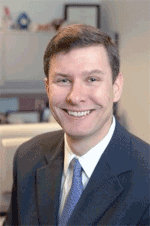By Patheos staff
 An interview on faith in the workplace with Scott MacLean, former worker for InterVarsity Christian Fellowship and now the CIO of the Newton-Wellesley Hospital in Massachusetts.
An interview on faith in the workplace with Scott MacLean, former worker for InterVarsity Christian Fellowship and now the CIO of the Newton-Wellesley Hospital in Massachusetts.
Patheos: You went from professional ministry, as a staff person for InterVarsity Christian Fellowship, to working in a secular business environment. What was your reasoning? Why did you feel that God was leading you in this direction?
Scott MacLean: My parents-and especially my father-expected me to succeed in business. I worked hard in college, earned an electrical engineering degree, and went to work for General Electric. Early on, I had enormous success. Yet I decided that I wanted to do something "different" before I turned 65. I was active in my church and was thinking about going to seminary. A wise mentor could see that I was falling into the trap of considering ministry more holy than secular work. He encouraged me to get some ministry experience before going to seminary. I decided on InterVarsity. I served in ministry and grew in my faith, and over time I recognized that I was not called to professional ministry and should use my gifts in business leadership. I earned an MBA in healthcare and have found a great niche as a healthcare CIO.
MacLean: It became clear to me that I was not as gifted as many people (including my wife) at professional ministry. It also was deeply draining. At that point I had many career options open. Applying for the healthcare MBA was what I discerned the next step to be. I did it with much trepidation; I felt called to integrate my technical and ministry experience in an industry that needed sound but compassionate management. It's worked out well, but I was considering clinical programs back then too. I believe I have found my calling, but there are always lingering questions about opportunities not pursued. When things are challenging at work, I wonder about keeping sustained. I suppose this is true for many people.
Patheos: How did your ministry years prepare you for the work you're presently doing? Do you feel you're better at your job than you would have been otherwise?
MacLean: Absolutely! My technical degree and my experience at General Electric meant that I was solid in business and technology. But it was through InterVarsity that I gained other important skills. I learned how to get along with people, how to influence indirect contributors, how to maximize productivity by utilizing the gifts of all people in a group, and more. IVCF was also leading the way with racial and gender reconciliation and the types of organizational development initiatives that have gained currency in corporations this decade. So I learned how to manage relationships and difference, how to guide a team and encourage my team members.
Patheos: You've become the CIO of your company. How does your faith inform your vision for your work?
MacLean: I believe that Christ is transforming all of culture, so that informs my outlook on my job. At this point in time, particularly with the American Recovery and Reinvestment Act (ARRA), information technology is thought to be a key element in making our healthcare system more affordable and efficient - and to help deliver better outcomes. I spend a lot of time with my leadership team, working on mentoring them and helping them become everything God has called them to be. This approach has really helped me to be successful in the operations and projects we are trying to accomplish at the hospital. I'm less interested in getting recognition, and more interested in seeing my employees thrive and get the credit for the good work they do. Another example is that I take a very broad perspective to the problems and challenges we face. Since my biggest aspiration is to see Jesus do his transformative work, I'm less invested in money or other metrics of short-run success. When intense situations or crises hit, I am able to take a more calm approach and help lead people through it.
Patheos: Do you feel the purpose of God in your work? Do you feel that what you do serves the kingdom of God?
MacLean: I absolutely do. I believe that Jesus is transforming all of culture. The work I do in the area of healthcare technology directly benefits suffering patients. Technology provides greater access to health care for everyone and improves clinical efficiency and clinical quality. Our work serves people -- doctors, nurses, hospital staff and ultimately patients. We all speak of our gratitude for health and how challenging life is without health -- so I know that our work is central to God's people.
Patheos: Do you find that you are able somehow to rest in God's presence as you go about your business?
MacLean: I am working on resting in God. Like many people who are driven, I am always trying to do more and make things happen on my own strength. Part of my professional and leadership development is to learn to let God pave the way and to make things happen using relationships.
Patheos: Many Evangelicals have qualms about 'witnessing' at work. What is your perspective on this? How do you represent Christ in what you do?
MacLean: I seek to witness, for the most part, through my personal conduct. I've been at my company for twelve years now, so I have developed some very deep relationships. When you work side-by-side with people, you go through a lot together and you form a bond. At this point, most of the people who are close to me know that I'm a person of faith. When opportunities arise to talk about faith, it is natural and easy. If an employee has a hard family situation such as a death or divorce, I can tell them that I am praying for them and they know that it's true. I don't feel the need to wear my faith on my sleeve; I've found that God brings it up when the timing is right. I just need to be willing to express my faith when the appropriate situation arises.
Patheos: Many right now are facing pressures to cut down the work force or even cut corners. Have you ever been pressed to make hard decisions - such as firing a hard-working employee, or engaging in an ethically dubious practice - and how have you approached those decisions?
MacLean: Healthcare is a bit behind the curve because of the COBRA payments, meaning that people keep their health insurance even after they lose their jobs. So we haven't hit the major cuts yet. I expect they will come soon and we will have to eliminate some people who are working very hard.
Our hospital has a culture of rewarding and recognizing the best employees and working with those at the low end to improve. If we have to cut, those who have not improved will be let go. They know who they are and why they will be chosen. We certainly believe that all God's children have dignity and gifts.
We want people to be successful, but we are not shy about moving people along when they would fit better in another organization.
Despite the sensational press about bad behavior, I find that most people I encounter in my work are above reproach. Our organization (with much government funding) is certainly focused on appropriate compliance with all federal, state, and local laws, and we put a lot of effort into making sure our employees behave appropriately and have a safe work environment. I have not been asked to do something that compromises my faith or values, and I would have to speak up if I were asked to do so.
Patheos: Finally, how do you understand the role of ambition in the Christian professional life? Do you wait for God to open up the chances in front of you - or do you "make your own luck"?
MacLean: Both. I am ambitious, and I have spent a lot of time working to meet people, learn things, and take classes and seminars to put myself in a good position to move forward. Looking back, however, I see that my most significant and appropriate experiences have been God-driven. The experiences I never planned for, that I never sought for myself deliberately, those experiences have served me the best in the roles I never could have known I would have!
For more in the Faith@Work Consultation series, click here.
7/14/2009 4:00:00 AM




